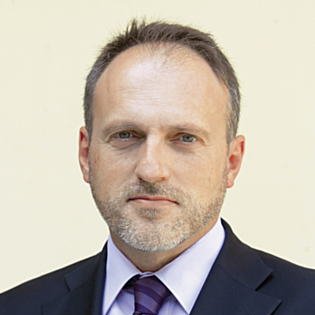
Prof. Gregoris Mentzas
Title: Developing the Data-Driven Proactive Enterprise (slides)
Abstract
The availability of multitudes of sensors, fast wireless connectivity and real-time predictive analytics methods allow companies to become ‘sensing enterprises’, i.e. they are able to gather and process information captured by sensors and ‘make sense’ of their environment by creating added value insights. Although such sensing capabilities are already a reality, this talk argues that the strategic value of (big) data analytics could be increased by supporting data-driven decision making and enabling the ‘proactive enterprise’ which exploits the observe-orient-decide-act (OODA) pattern of situational awareness. Proactivity refers to the ability to avoid or mitigate the impact of undesired future events (e.g. the loss of a customer to a competitor) or exploit future opportunities (e.g. an increase in demand for a product), even before these actually happen, and trigger appropriate actions. A system architecture implementing the proactive principle integrates data from various sensors, provides large-scale and real-time processing of big data and combines historical and domain knowledge with current data streams in order to facilitate proactive decision making. The talk will outline the current research challenges for supporting proactivity, e.g. processing of structured and unstructured data, enabling advanced complex event processing and augmenting decision-making with fuzzy and probabilistic methods that handle uncertainty on the predicted value of information items. Recent research efforts in proactivity will be given with focus on proactive manufacturing.
Bio
Gregoris Mentzas is Professor of Information Management at the School of Electrical and Computer Engineering of the National Technical University of Athens and Director of the Information Management Unit (IMU, http://imu.ntua.gr), a multi-disciplinary research unit at the University. His area of expertise is information technology management and his research concerns knowledge management, semantic web and e-service technologies in e-government and e-business settings. He has coordinated or participated in more than 40 international research projects funded by the European Commission and other funding bodies. He is an Associate Editor in five scientific journals and was Program Committee member in more than 60 international conferences and workshops. He has (co-)authored or edited 4 books, published more than 200 papers in international peer-reviewed journals and conferences and has received more than 3,300 citations (h-index: 31). Research carried out by his group has led to the establishment of three internet technology companies. He has acted as grant evaluator and/or external reviewer in information technology programs funded by agencies such as the European Commission, the Swiss National Science Foundation, the Austrian Science Fund and the Cyprus Research Promotion Foundation. More info at http://imu.ntua.gr/users/gmentzas.

Prof. Jorge Sanz
Title: Why Business Analytics is not the same as Data Science: Do enterprises really care about the difference?
Abstract
In this talk, I will briefly review how people do analytics with or for different competences in organizations. In particular, I will share common struggles, some challenges and many success stories. The lessons-learned from over one hundred experiences in many segments of industries and Lines-of-Business is that analytics is quite promising and at times, it even delivers what it promises. But people (people who “play with data” empowered by their mathematics or computer science background) may end up really messing the opportunities (i.e., credibility for the domain) or misguiding results (i.e., losing money and management endorsement). The insatiable IT industry appetite, poor business background and lack of guidance for the enterprise are the common reasons for many failures.
Interestingly, we now also see that “data” is also a “science”. Quite worrisomely, we witness that this marketing verbiage is being followed by many academics. I will try to make the point of why enterprises need to be very careful with the actual content behind the buzzwords when it comes to carrying out “analytics”. Is it “data analytics”, “business analytics”. “data science” or perhaps, something else ? Does it matter whether these are different concepts or not and why a practitioner needs to care ? Underlying some of the above stories and lessons-learned, it lies the omnipresent reductionist approach: the goal of reconstructing behavior and predicting what it is going to happen to living entities by using only digital footprints. For some people, some data (eventually lots of it, it does not really matter whether it is relevant or not) and machine learning (is this all about renaming inferential statistics and the artificial intelligence from the eighties ?) will control all decision-making in the world. In this curious and popular philosophy, the notion of “raw data” can then be explained as the (probably, uninformed) intention of “immunizing” the observation of reality from all human intervention. In other words, for many, “raw data” is the only source of unquestionable validity, i.e., the foundation for all enterprise decision-making.
I will offer a number of examples regarding the above subjects from the last seven years of applied research and practice in the US, Asia and more recently in Europe. If time permits, I will suggest a few directions with potentially fruitful activities to focus on actual value-creation, and remind ourselves about the mission we have as academic researchers and educators in this domain. Finally, I will briefly discuss how all this relates to “information processes”, i.e., Business Informatics.
Bio
Prof. Dr. Jorge Sanz has over 30 years of applied research and consulting experience. He has specialized in financial services, telecommunications and government for the Americas, Europe and Asia. He works in operations strategy and on the application of information technology for transforming organizations. He has worked at different times in IBM, as a Director on international assignments and also, for over 20 years in the Research Division located in Sillicon Valley, California.
Jorge conducts analytical modeling for business problems in companies, with applications in process innovation for front-office and back-office operations, and enterprise performance management in firms. He specializes in predictive models for large data sets and infrastructure for data-centric computing applied to different lines-of-business such as Finance and Accounting and Customer Operations.
Jorge leads international academic and professional communities in Business Analytics, Business Informatics and Enterprise Engineering. He is a frequent key-note speaker on the interplay between business and IT in international conferences. He has been Rector of the University of St. Andrews, has held different professorial positions in the University of Illinois at Urbana-Champaign and has also been a Visiting Professor in the University of California.
Jorge is the Founding Director of the Business Analytics Centre at the National University of Singapore (NUS). He holds a Visiting Professor position at the NUS School of Computing and teaches Business Analytics for graduate students in NUS Business School as well. He is also the Chief Innovation Officer for Retail Banking in IBM Corporation. He actively consults for Asian, European and American companies.
Jorge is Fellow of the IEEE Society.

Odysseas Charalambous
Title: Digital Disruption
Abstract
The convergence of internet based technologies with analytics, AI, wireless technologies, etc. has given rise to new business models that disrupt traditional businesses across sectors and industries. This affects everything that can be digitised, from products and services to the entire supply chain. Unfortunately, few companies are building the organisational capabilities and strategic responses to compete in this new reality. During the presentation a number of such examples and models will be presented and analysed with reference to the way that they can be used by traditional businesses to build the agility to anticipate threats, sense opportunities and seize them before rivals do.
Bio
Odysseas Charalambous linkedin page https://www.linkedin.com/in/odysseas-charalambous-ab21ab10.